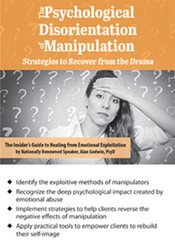The Psychological Disorientation of Manipulation -Strategies to Recover from the Drama – Alan Godwin
The Psychological Disorientation of Manipulation -Strategies to Recover from the Drama by Alan Godwin,
Salepage link: At HERE. Archive:
- Faculty:
- Alan Godwin
- Duration:
- 5 Hours 42 Minutes
- Format:
- Audio and Video
- Copyright:
- Dec 13, 2017
Description
He’s in my head. She sucks all the air out of the room. I’m so tired of the drama. These are common ways of expressing the all-consuming intrusiveness of being emotionally manipulated. The manipulators might be relationship partners, neighbors, co-workers, family members, or “friends”, and they occupy psychological space so pervasively that many clients present with complaints of confusion, exhaustion, and the struggle to even know what’s real.
Dr. Godwin focuses on the psychological effects of manipulation and how therapists can help clients recover from this deeply damaging emotional abuse. Discover how manipulators succeed at getting inside people’s heads, how they wreak havoc in all aspects of a person’s life, the best treatment interventions to assist your clients in their recovery, and strategies to avoid being manipulated. You’ll walk away with practical tools to help clients overcome the negative psychological impact of manipulation.
Handouts
| Manual – The Psychological Disorientation of Manipulation (0.89 MB) | 71 Pages | Available after Purchase |
Outline
HOW MANIPULATORS EXPLOIT
- Public-private incongruence
- Consistent inconsistency
- Projective identification
- False moral equivalence
- Incremental acclamation
- Exploitation of naiveté
- Identity under-development
- Deficient moral reasoning
- Cognitive dissonance
- Information glut
- Demagoguery
HOW MANIPULATORS WREAK HAVOC
- Mood alterations
- Value alteration
- Self-deprecation
- Lingering bewilderment
- Foreclosed thinking
- Follower corruption
- Groupthink
- Tribalism
- Societal contentiousness
TREATMENT STRATEGIES
- Know the tactics
- Value your signals
- Trust in increments
- Seek external validation
- Limit the re-telling
- Avoid future ensnarements
- Develop ambiguity tolerance
- Cultivate independent critical thinking
- Allow for conflicting opinions
- Resist the tribal temptation
- Seek common ground
CASE EXAMPLES
Faculty
Alan Godwin, PsyD Related seminars and products: 5
Alan Godwin, PsyD, is a licensed psychologist in private practice with nearly 30 years of experience. Certified in Alternative Dispute Resolution, he has dedicated himself to helping individuals, couples, churches, and businesses develop better ways of handling conflict. In addition to his private practice, Dr. Godwin serves on the adjunct faculty of the Graduate Counseling Department of Trevecca University in Nashville, TN, where he teaches a class for doctoral students entitled “Psychodynamic Psychotherapies.” He has also taught undergraduates and has guest lectured in the Marriage and Family department.
Additionally, he has penned a regular quarterly feature entitled “Ask Dr. Alan” for Deacon magazine, writes a weekly email called “The Drama Review: In Relationships and Culture,” and has been a guest on numerous radio and television programs across the U.S. and Canada. Dr. Godwin’s book, How to Solve Your People Problems: Dealing with Your Difficult Relationships, explains how and why conflict goes badly and how to make it go well with two types of people: reasonable and unreasonable.
Speaker Disclosures:
Financial: Alan Godwin maintains a private practice. He receives a speaking honorarium from PESI, Inc.
Non-financial: Alan Godwin has no relevant non-financial relationship to disclose.
